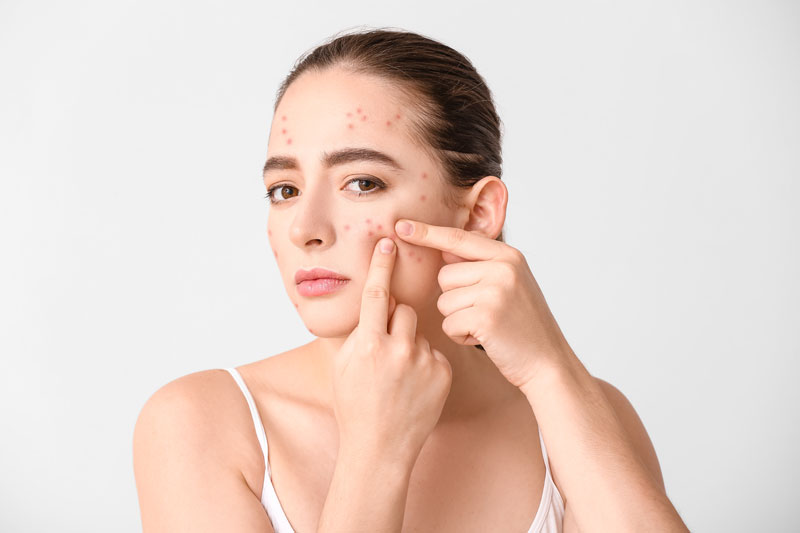Sometimes your skin can feel impossible to manage — especially when a breakout or a cold sore shows up at the worst moment. The good news? You can prevent and treat most common skin problems with the right care. Let’s explore some expert-backed tips to keep your skin healthy, clear, and glowing.
Acne: Understanding & Managing Breakouts
A pimple forms when pores get clogged by sebum, an oil that normally protects the skin and hair. Teens often produce more sebum due to hormonal changes, leading to breakouts in the T-zone — the forehead, nose, and chin.
How to Prevent & Treat Acne:
- Cleanse twice a day with warm water and a mild acne-friendly soap. Avoid harsh scrubbing.
- Use benzoyl peroxide lotion (OTC) after cleansing to fight bacteria.
- Don’t pop pimples. It can worsen swelling and cause scars.
- Keep hands and objects away from your face — including your phone and pillowcases.
- Wash glasses and sunglasses regularly to prevent oil buildup.
- Avoid tight clothes if you get acne on your back, chest, or shoulders.
- Remove makeup before sleeping and choose “noncomedogenic” products.
- Keep hair clean and off your face.
- See a dermatologist if over-the-counter products don’t work or acne leaves scars.
Sun & Skin: Smart Protection Is Key

Sunlight helps your body produce vitamin D, but it can also damage your skin.
Sun Safety Tips:
- Use sunscreen (SPF 30+), even on cloudy days.
- Reapply every 1.5 to 2 hours — especially after swimming or sweating.
- Choose broad-spectrum sunscreen with UVA and UVB protection. Lotions offer better coverage than sprays.
- Avoid the sun between 10 a.m. and 4 p.m. — or seek shade and wear protective clothing.
- Wear sunglasses and a hat with 100% UV protection.
- Some acne medications increase sun sensitivity — ask your doctor if you need extra protection.
- Avoid tanning beds. Use self-tanners instead for a safer glow.
Cold Sores: Prevention & Comfort Tips

Cold sores are caused by HSV-1 and often appear as blisters on the lips. They’re contagious and tend to come back occasionally.
Cold Sore Care:
- Don’t share lip balm, utensils, or drinks.
- Limit triggers like sun, stress, or illness.
- Ease pain with acetaminophen, ibuprofen, or ice pops.
- Avoid acidic, salty, or spicy foods when you have a sore.
- Don’t pick at blisters. It can cause infection or spread the virus.
- Consult a doctor if cold sores are frequent — prescription meds can help reduce symptoms.
Eczema: Managing Flare-Ups

Eczema causes dry, red, itchy skin — often around the elbows, knees, neck, or face. It can’t be cured completely, but it can be controlled.
Eczema Relief Tips:
- Avoid harsh soaps, perfumes, and detergents.
- Take short, warm showers. Hot water dries out the skin.
- Use fragrance-free moisturizers after bathing to lock in hydration.
- Wear soft fabrics like cotton — avoid wool and spandex.
- Manage stress with activities like yoga, walking, or deep breathing.
- Use dye-free makeup to avoid irritation.
- Talk to a dermatologist for prescription creams or lifestyle advice.
Other Skin Issues
Warts:
- Caused by HPV viruses.
- Avoid touching or scratching — it spreads infection.
- OTC treatments work, but consult a doctor first.
- Genital warts? See your doctor for safe treatment.
Molluscum Contagiosum:
- A wart-like virus that spreads via touch.
- Treatable and usually harmless — but contagious.
Stretch Marks:
- Common during puberty or growth spurts.
- They fade over time.
- See a dermatologist if you want treatment options.
Healthy Skin = Healthy You

Your skin does more than make you look good — it protects you from the outside world. Take care of it with:
- A balanced diet
- Plenty of water
- Regular exercise
- Stress management
- A consistent skincare routine
When in Doubt, See a Dermatologist
If skin problems persist or affect your confidence, always consult a licensed dermatologist. They can offer targeted treatment plans and help you achieve healthy, glowing skin safely.
Also Read : Best Skincare Products for Menopausal Skin: Stay Radiant



